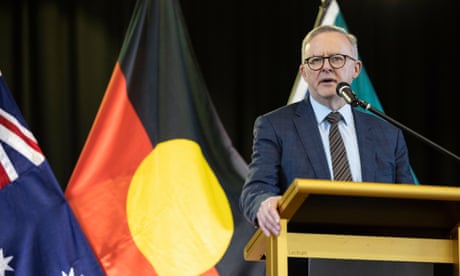- by foxnews
- 04 Mar 2025
Opposition growing to government’s proposed changes to referendum laws before voice vote
Opposition growing to government’s proposed changes to referendum laws before voice vote
- by theguardian
- 11 Jan 2023
- in news

The federal government is coming under increasing pressure to reinstate funding for public campaign material ahead of the voice to parliament referendum amid fears social media will become the main provider of vital electoral information.
Uphold and Recognise, a prominent advocate of Indigenous constitutional recognition, said the government could "erode confidence in the legitimacy" of the vote if it made major changes to established referendum protocols.
"For a vote this important, parliamentarians must consider if electors should rely on social media to be the provider of information on such an important issue," Uphold and Recognise's executive director, Kerry Pinkstone, told the parliamentary committee investigating the government's proposed changes to the Referendum Act.
The changes under consideration by the joint standing committee on electoral matters include declining to provide public funding for either the yes or no side and abolishing the printing of official pamphlets outlining the campaign arguments.
The government has sought to abolish an "antiquated" rule requiring the printing of the pamphlets to educate voters. Referendum laws require the government to produce and mail information pamphlets to voters, containing 2,000-word essays from those in favour and those opposed to the referendum change. That provision would be scrapped.
Constitutional expert George Williams called the pamphlet "not fit for purpose". The special minister of state, Don Farrell, said the Referendum Act "does not reflect modern delivery and communications methods".
But groups such as the Australian Human Rights Commission (AHRC) want the pamphlet maintained, noting recent parliamentary reports had supported it.
"The provision of an official 'yes/no' pamphlet is a way of ensuring that electors are provided with alternative points of view in the one document, to consider and compare, and that all electors are provided with the same basic information about the substantive arguments," the AHRC said in its submission.
The AHRC expressed concerns about social media misinformation in the absence of official information, and called it "preferable" for the pamphlet to be prepared by politicians who spoke on the bill in parliament.
Uphold and Recognise, a pro-voice group co-founded by the now shadow Indigenous affairs minister, Julian Leeser, said it was a matter of "respect" that voters should be provided with the reasoning of parliamentarians.
"Whether or not they choose to read the pamphlet is their own business," Pinkstone said in her submission.
"However, if the committee considers that this issue is serious enough to ask electors to vote at a referendum, then consideration should be given to the quality of the information provided to make informed decisions on such important matters."
Guardian Australia understands among the government's motives for scrapping the pamphlet and public campaign funding was to avoid elevating anti-Indigenous sentiment. Pinkstone acknowledged risks in giving equal weight to a "minority view", but suggested that be countered by including a tally of politicians supporting the yes and no cases.
Greg Craven, a director at Uphold and Recognise, said this week he believed the referendum had "a very slim chance of success" because Australians didn't have enough information about the voice, calling on the government to outline more detail.
The Law Council of Australia agreed parts of the Referendum Act were not fit for purpose, but said scrapping the pamphlet ran the risk of a "well-resourced supporter or opponent of a referendum" running a big-spending campaign, or misinformation spreading.
Gabrielle Appleby, a constitutional expert at the University of New South Wales and the Indigenous Law Centre, recommended the pamphlet be updated. She suggested a government panel create the pamphlet, including "clear and neutral explanation" of changes as agreed by legal experts, distributed via mail and social media.
The Institute of Public Affairs, providing strategic support to the no side, claimed scrapping the pamphlet and not allowing public funding meant the government would "deny voters the ability to hear the no case".
The thinktank called the pamphlet "an important and indispensable feature of Australian political tradition".
The Warringah independent MP, Zali Steggall, called on the government to "explain in detail" its plans for providing that information, and again suggested laws prohibiting misleading and deceptive political advertising.
- by foxnews
- descember 09, 2016
Bus travel sees 'steady growth' as flyers seek alternative transportation
People who ride on airplanes might rely on alternative transportation for a number of reasons. A CEO of a bus travel company shares insights with Fox News Digital.
read more


